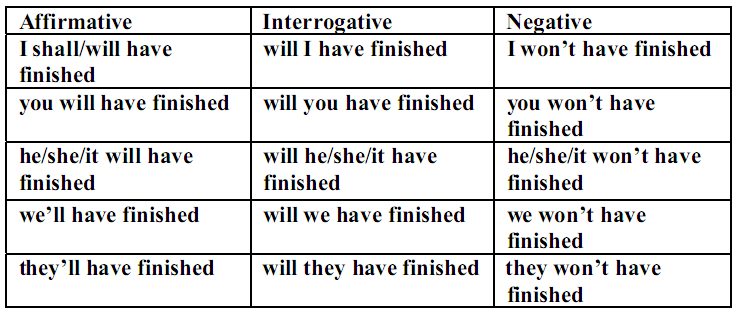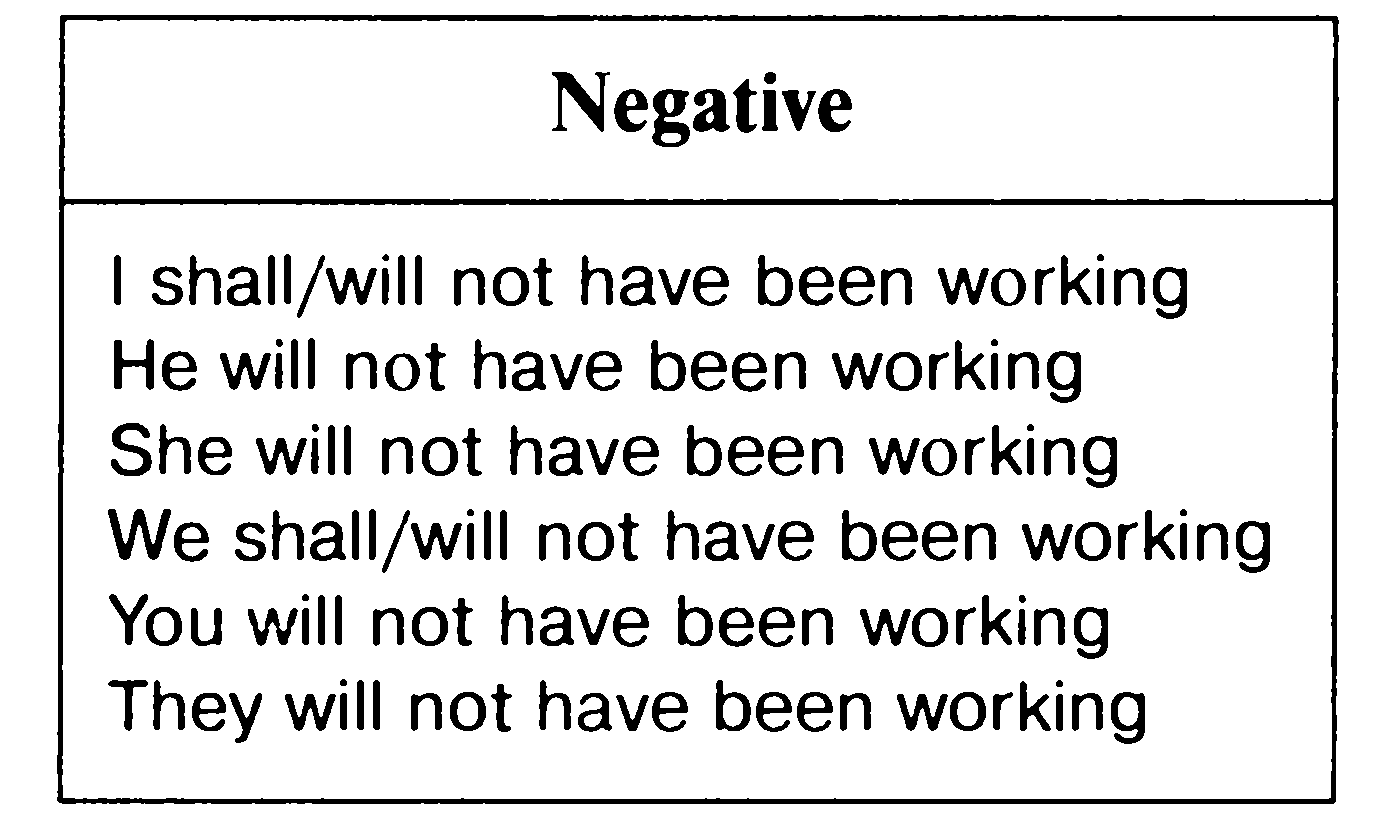
- •Практическая грамматика английского языка
- •Часть 1
- •I семестр
- •In this unit you are to revise the main grammar phenomena Form a
- •In this unit you are:
- •Part a. Theoretical Material
- •Part b. Practical Exercises
- •Part c. Mini-test
- •I. Guess
- •In this unit you are:
- •Part a. Theoretical Material
- •Part b. Practical Exercises
- •Part c. Translation and editing section
- •Part d. Revision exercises
- •Part a. Theoretical Material
- •Part b. Practical Exercises
- •Part c. Translation and editing section
- •Part d. Revision exercises
- •Part a. Theoretical Material
- •But: How long is it since you last saw her?–It is ages since I last saw her.
- •Part b. Practical Exercises
- •Part d. Revision exercises
- •Part a. Theoretical Material
- •I / he / she / it we / you / they had been working
- •Part b. Practical Exercises
- •Part c. Translation section and editing section
- •Part d. Revision exercises
- •Part a. Theoretical Material
- •Other Ways of Referring to the Future
- •Part b. Practical Exercises
- •Part c. Translation section and editing section
- •Part d. Revision exercises
- •Part a. Theoretical Material
- •Part b. Practical exercises
- •Part a. Tenses
- •Part b. General Practice
- •Part c. Translation
Part a. Theoretical Material
The Future Simple
Formation. It is an analytical form which is built up by means of the auxiliary verbs shall/will and the infinitive stem of the notional verb.

Main Uses
The Future Simple is used to denote:
− a single action completed in the future: I shan’t stay with them. It will be cold in the evening.
− habitual, repeated actions in the future: Next year we’ll meet each other more often. So I’ll see you often in winter?
− a succession of actions in the future: He’ll ring you up and tell you everything. I’ll wait in the next room and come back when she’s gone.
− permanent future actions generally characterizing the person denoted by the subject of the sentence: I’m afraid he’ll be a bit lonely, poor darling.
– prediction about the future: Tonight’s programme will be very interesting.
− an action decided on spontaneously, out of circumstances: I’m too tired to walk home. I’ll take a taxi.
The Future Simple in such cases often has the meaning of a promise, an offer, a warning.
I won’t tell anybody, I promise. I’ll pick you up to the airport. I shall punish you.
– formal announcements of future plans: The new President will move into the White House tomorrow.
– weather forecasts: Rain will continue throughout the day.
– hopes, expectations, thoughts about the future. Used after the verbs like assume, believe, doubt, expect, hope, reckon, suppose, think, be sure, be afraid and with adverbs like perhaps, probably, possibly, definitely: I expect, you’ll be here soon. Do you think she’ll bring her boyfriend?
− an enquiry for an instruction, recommendation or advice in interrogative sentences: Shall we do it right now? Shall I help you?
− refusals, resistance or reluctance to do something, typical behavior: The door won’t open. I’m always asking him to come but he won’t. She will always argue to prove her point of view.
– willingness to do or not to do something in the future: I promise I'll be there. I’ll never speak to him again.
a) promise: I’ll do it for you. b) request: Will you open the window? c) offer: I’ll look after the children for you. d) refusal: I won’t go with you. |
e) agreement: Yes, I will go with you. f) determination: I’ll certainly tell the truth. g) threat: Stop it. I’ll call the police. |
The use of shall
In spoken English, shall is most often used in the questions with I or we to make offers or suggestions, advice instructions: Shall I come with you? What shall we do tomorrow?
Shall is occasionally used to express strong determination about oneself or someone else: I shall go away. I don’t care what you think.
Be Going to – The Present Simple – The Present Continuous –
The Future Simple
Be going to |
The Present Simple |
The Present Continuous |
The Future Simple |
always indicates a link with the present 1. is used to make predictions based on the present evidence: There are a lot of clouds in the sky. It is going to rain. 2. is used to talk about one’s intensions: I’m going to have a rest in the evening. |
1. official plans, schedules and itineraries: The train leaves Plymouth at 11.30 and arrives in London at 14.45. 2. in subordinate clauses of time and concession: If I have time, I’ll visit you tomorrow. |
1. is used to talk about personal plans for the future: We’re having a housewarming party tomorrow. |
1. is used to make predictions based on one’s point of view: You’ll like it. 2. is used to introduce facts about the future: She will be 17 next year. 3. is used to talk about decisions made at the moment of speech: Today’s Ann’s birthday. – I’ve forgotten. I’ll phone her. 4. to express beliefs, thoughts, assumptions, doubts about the future: I’m sure you’ll enjoy the play. |
Sometimes it is more appropriate to use ‘will’ rather than ‘be going to’ in
1) offers and suggestions (willingness): I’ll help you with your physics homework, if you like.
2) requests: Will you help me with my physics homework?
3) most conditional sentences: If I get a computer, we’ll be able to surf the Internet.
NOTE! With offers and suggestions in the question form we use shall with I and we. Shall I help you with your physics homework? |
The present simple used to describe the future
We use the Present Simple when we talk about future events that are part of some OFFICIAL ARRANGEMENT such as a timetable or programme: Their plane arrives at 2 o’clock in the morning. The next meeting of the committee is on November 5th .
We don’t use the present simple when we talk about PERSONAL PLANS or PREDICTIONS. Instead we use ‘will’, ‘going to’, or the present continuous: I’m really exhausted. I'm just staying in to watch TV tonight. Although it is a problem only in Britain at the moment, I think it will affect the rest of Europe soon.
We use the present simple to refer to the future, not will, in adverbial clauses introduced by time conjunctions such as after, before, when, and until:
After you go another 50 metres, you'll see a path to your left. When you see Dennis, tell him he still owes me some money. Wait here until I call you.
and in conditional clauses with if, unless, in case, and provided:
Let me know if he says anything interesting. Provided the right software is available, I should be able to solve the problem. I’ll bring a compass in case we get lost.
The Future Continuous
Formation: It is an analytical form which is built up by means of the auxiliary verb to be in the simple future and participle I of the notional verb.

Main Uses
The future continuous is used to denote:
1) an action or event that will be in progress at a definite moment in the future, which is indicated either by an adverbial phrase or clause (at 2 p.m., at this time tomorrow, when you arrive etc.): At four o’clock on Tuesday afternoon we’ll be flying over Vienna.
2) an action or state that will be going on over a period of time in the future, indicated by adverbial phrases such as all evening, during holidays, from October to November, for the next few weeks or an adverbial time clause (with while) for a parallel future action: I’ll be living in London for three weeks next summer. The Browns will be staying at my place all weekend.
3) a future action viewed by the speaker as part of a regular routine: Will you be going anywhere near the post-office today? – Yes, I’ll be passing it on my way home.
4) a future event which has already been arranged: I’ll be seeing him tomorrow.
NOTE! ‘Be going to’ or the present continuous + time word can frequently be used instead of the future continuous. The main difference between the three is that ‘be going to’ and the present continuous + time word usually refer to planned or intentional futures: I’m going to see her tomorrow – we arranged it last week. I’m seeing her tomorrow, to talk about the new contract.
The future continuous is less intentional: I’ll be seeing her tomorrow at the weekly sales conference. I’ll talk to her about it then.
5) to refer to the present, when we are guessing about what people are doing: Peter and Tom will be lying at the beach in Corfu at the moment.
The Future Simple – the Future Continuous
the future simple |
the future continuous |
expresses intention, belief, hope, assumption or willingness I’ll come and visit you tomorrow. – intention, promise
Will you come to the meeting tonight? – request |
indicates future activity or event but does not denote intention or willingness I’ll be coming to see you tomorrow so I can bring the magazine then. – future activity in a normal course of events Will you be coming to the meeting tonight? – casual question about a future event |
The Future Perfect
Formation: It is an analytical form which is built up by means of the auxiliary verb to have in the simple future and the participle II of the notional verb. (e.g. He’ll have read the book by that time.)

Main Uses
The future perfect is used to denote:
1) an action viewed as completed by a definite future moment or before another future action: My sister will have left school by July.
2) (with statal verbs) an action lasting over a certain period of time up to the given future moment: Kate will have been a student for half a year by March.
The Future Perfect Continuous
Formation. The future perfect continuous is formed analytically by means of the auxiliary to be in the future perfect (shall/will have been) and participle I of the notional verb.


Main Uses. The future perfect continuous denotes an action lasting for a period of time up to or including a certain future moment. This moment can be indicated by an adverbial with the preposition by or by another future action. The Future Perfect Continuous is normally used to emphasize the process rather than the future result. E.g. By the end of the year, they’ll have been working at this project for two years.
